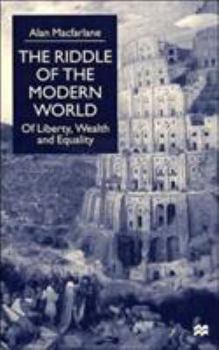The Riddle of the Modern World: Of Liberty, Wealth and Equality
Select Format
Select Condition 
Book Overview
What conditions the chances of liberty, wealth, and equality at the start of the third Christian millennium? Why did human civilizations develop so slowly for thousands of years, and then transform themselves during the last three hundred? This study of four great thinkers who lived between 1689 and 1995 - Montesquieu, Adam Smith, De Tocqueville, and Ernest Gellner - weaves their lives and works together and through their own words shows how they approached the question of the nature of humanity, our past and our future.
Format:Hardcover
Language:English
ISBN:0312232047
ISBN13:9780312232047
Release Date:October 2000
Publisher:Palgrave MacMillan
Length:326 Pages
Weight:1.40 lbs.
Dimensions:1.0" x 5.7" x 8.8"
Customer Reviews
2 ratings
Convinving Look Into Sources of English Exceptionalism
Published by Thriftbooks.com User , 21 years ago
In "The Riddle of the Modern World," Alan Macfarlane "seeks to find the sources of English exceptionalism that ushered in the modern world, looking through the eyes of a number of witnesses from the seventeenth to the twentieth centuries who have thought about these sources in a comparative framework. The first of these authors is Baron de Montesquieu (1689-1755), who lived around the time England was breaking away from the European herd and establishing the institutions that would bring about the Industrial Revolution. The next is Adam Smith (1723-90), who lived just at the cusp of the changeover from an agrarian economy to an industrial mineral-energy-using economy. The third is Alexis de Tocqueville (1805-59), who lived when modernity had become manifest both in England and in its offshoot, the United States of America. The fourth is the contemporary sociologist and anthropologist Ernest Gellner (1920-95).""This strategy is an interesting one, and Macfarlane's thumbnail sketches of the lives and though of these thinkers are cogent and concise. I learned a great deal from his discussion of Montesquieu, and I am sure that readers who do not know the writings of the other thinkers discussed in the book will likewise find much of interest in it."-From "The Independent Review," Fall 2002
Love it!
Published by Thriftbooks.com User , 24 years ago
Fantastic book! MacFarlane examines the riddle of why mankind has done so well over the last 300 years, and what prevented these advancements from occuring earlier in our history. He uses the work of four "philosophers"; Montesquieu, Adam Smith, Alexis de Tocqueville, and Ernest Geller to throw light on the role that liberty, wealth, and democracy have played. The book is broken down into four sections. Each section starts with the life and times of the philosopher in question. Then their ideas and discoveries about the world around them are examined in detail. Each one contributes to the "solution" to the "riddle". I have been reading a lot of Hayek lately, and many of the ideas he refers to in passing in his work are laid out much more throughly here. If you enjoy history, and are particularly interested in the development of liberty and understanding how individual liberty leads to wealth and better conditions for all, you should buy this book. Also, if you are interested in anyone of the four philosophers mentioned above, you'll be treated to a clear overview of their life and work in the context of the book's subject. It's expensive, but worth it. Buy it before it goes out of print again!





